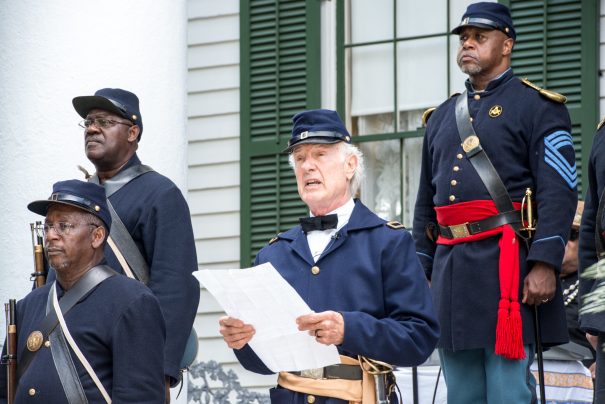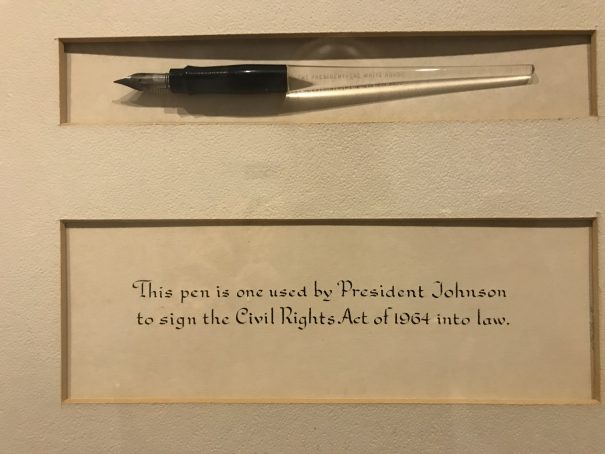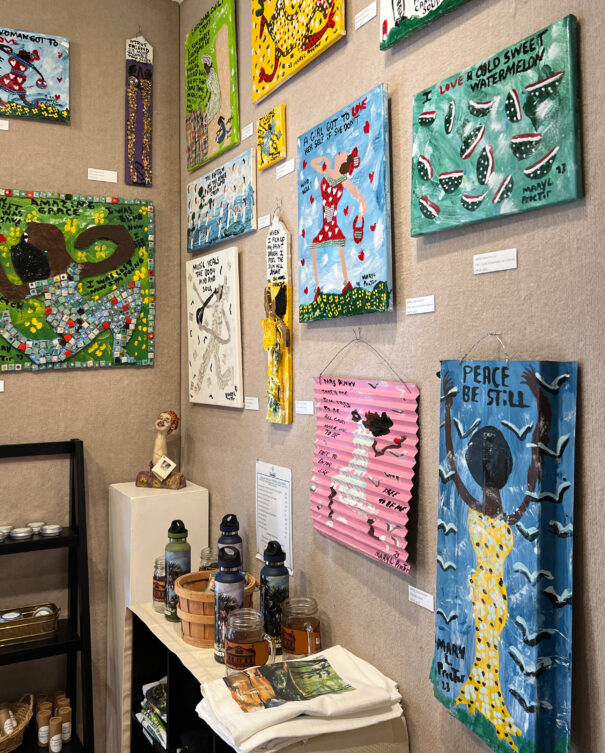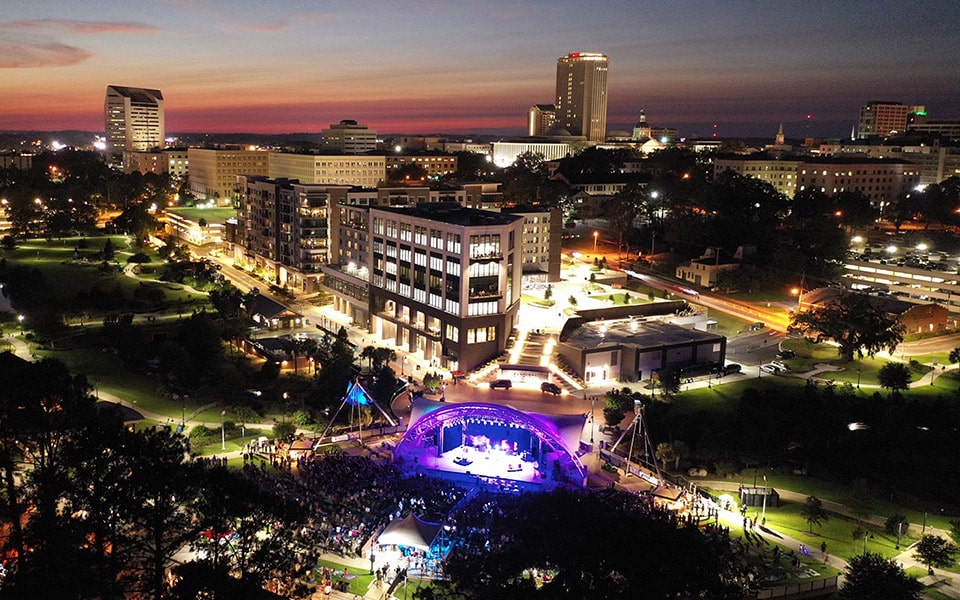
Explore the Culture, Sites and Stories of African Americans in Tallahassee
Explore the Culture, Sites and Stories of African Americans in Tallahassee
Black History Month honors the triumphs, aspirations, and cultural legacy of Black Americans. With unwavering perseverance and remarkable achievements across art, music, literature, architecture, sports, science, and more, Black history is a source of inspiration for all.
Historic Leaders and Influences
Throughout history, countless Black leaders, artists, activists, and visionaries have made—and continue to make—an indelible mark on our community. Remarkable contributions from civil rights, the arts, literature, food, and more shape and influence Black history in Leon County/Tallahassee.
From civil rights icons like Rev. C.K. Steele, Wilhelmina Jakes, and Carrie Patterson to historic Black entrepreneurs such as George Proctor—a freed slave and builder of some of Tallahassee’s most cherished homes—the impact of Black leaders resonates throughout Leon County. The John G. Riley Center and Museum for African American History and Culture, listed on the National Register of Historic Places, stands proudly in downtown Tallahassee, serving as a poignant reminder of the African American neighborhood of Smokey Hollow, which spanned what is now Cascades Park.
Florida Emancipation and Civil Rights
Leon County has long stood at the forefront of pivotal movements in the fight for freedom and civil rights. A cornerstone of this legacy is May 20, 1865, when the Emancipation Proclamation was first read in Florida on the steps of the Knott House—nearly a month before it reached Texas on June 19, now celebrated as Juneteenth. May 20 now marks the official end of slavery in Florida and continues to be commemorated as Florida Emancipation Day. Decades later, the 1956 Tallahassee Bus Boycott, led by Florida A&M University students, further solidified the city’s role as a catalyst for progress in Black history and civil rights.
Florida A&M University (FAMU)
Founded in 1887, Florida Agriculture & Mechanical University (FAMU) is among the nation’s most prestigious historic Black universities and a cornerstone of Leon County and Tallahassee. Home to one of the principal repositories relating to African American history and culture in the Southeast, the Meek-Eaton Black Archives Research Center & Museum is one of only 10 Black archives in the country.
Ongoing Community Events
Black history in Leon County continues to thrive through events and traditions that celebrate Black culture and heritage. Annual gatherings such as the Martin Luther King, Jr. Day Celebration and Parade, the Harambee Festival, Frenchtown Rising, and the Jubilee Gospel Festival bring the community together in celebration and reflection. Visitors and residents alike can immerse themselves in Black heritage through these events and other initiatives.
The Frenchtown Neighborhood
The Frenchtown neighborhood, developed during the Reconstruction era as land set aside exclusively for recently freed slaves after the Civil War, offers a poignant journey through history. Visitors can explore the Soul Voices of Frenchtown trail, a series of markers that recount the rich stories of this African American community through the voices of local historical figures.
The Grove Museum
A pivotal chapter in the civil rights struggle is preserved at The Grove Museum, one of the best-preserved homes originally built by enslaved African Americans and later the residence of Governor LeRoy Collins, a leader in advancing civil rights in Florida. The museum will offer special Black History Month tours on February 7 and February 28, 2025. These guided tours, led by the museum’s founding director John Grandage, focus on local Black history, The Grove, and broader themes of American history and historic preservation.
Part of the Grove Museum Collection
African American Genealogy
For residents and visitors interested in exploring African American genealogy, the Tallahassee African American Genealogical Society (TAAGS) offers a vital resource dedicated to preserving history. Officially established on January 1, 2019, TAAGS fosters education and interest in African American genealogy by connecting individuals with shared interests and providing valuable resources for historical research. The society hosts monthly meetings at St. Michael and All Angels Episcopal Church, welcoming anyone passionate about documenting and sharing their family histories.
Jazz Heritage
Enjoy a performance by the Count Basie Orchestra, an enduring symbol of jazz excellence founded by pianist and bandleader William James “Count” Basie. The group is now directed by Scotty Barnhart, Florida State University faculty member and Tallahassee native, internationally acclaimed jazz trumpeter, composer, arranger, educator, and author. The Grammy Award-winning ensemble will take the stage on February 28, 2025, as part of Opening Nights. This world-class performance offers a captivating celebration of Black artistry through the timeless sounds of jazz.
Tallahassee pays tribute to jazz legends Julian “Cannonball” Adderley and Nathaniel “Nat” Adderley with the Adderley Amphitheater at Cascades Park. The brothers, who grew up in Tallahassee and attended Florida A&M University, rose to fame playing with icons like Ray Charles and Miles Davis before pioneering soul jazz with The Cannonball Adderley Quintet. Renaming the amphitheater in their honor highlights their lasting impact on music and the city’s rich Black history.
Recent Tributes
The newly renamed T-Pain Lane, formerly known as Pasco Street, celebrates another Tallahassee-born music icon, honoring his groundbreaking contributions to music and his lasting impact on the community. This street renaming, which took place in November 2024 prior to T-Pain’s sold-out show during Tallahassee-Leon County’s Bicentennial Weekend, recognizes T-Pain’s significant influence on the music industry, particularly his innovative use of auto-tune, which revolutionized popular music. It also serves as a testament to his enduring connection to his hometown and his inspiration for aspiring artists in Tallahassee.
Art Exhibitions & Cultural Events
Art exhibitions and cultural events take center stage this month, offering a rich celebration of Black heritage and creativity. On January 16, 2025, FAMU’s Foster-Tanner Fine Arts Gallery presented two compelling exhibitions by Stan J. Johnson: “Beautiful, I Am!” and “Naked Emotions Exposed.” On January 23, 2025, Joe Roache’s “Southern Exposure” opened at LeMoyne Arts, adding to the month’s vibrant offerings. Meanwhile, the FSU Museum of Fine Arts (MOFA) features “The Quilts of Mrs. Gussie Beatrice Arnold Hill,” on display through February 8, 2025, highlighting the intricate artistry of quilting and its deep cultural significance. The Anderson Brickler Gallery on S. Adams Street, founded and directed by Dr. Celeste B. Hart, MD, features fine art editions and works on paper by modern, post-war and contemporary artists with a focus on African diasporan artists. Based in Tallahassee, Florida’s Virtual Civil Rights Museum serves at the only statewide-focused civil rights museum in Florida and, being entirely virtual, aims to facilitate live visitation throughout the state and nation.
Local Artists
Local artists play an integral role in honoring and celebrating Black heritage. Eluster Richardson, celebrated for his poignant portraits—particularly of children—has showcased his work at the Smithsonian Institution, and the Riley House Museum, where he serves as Artist-in-Residence. Nearby in Monticello, folk artist Mary Proctor is renowned for her vibrant and inspirational pieces, which can be explored locally at LeMoyne Arts. Artist Quia Z. Atkinson is quickly becoming one of Tallahassee’s premier artists and entrepreneurs, combining modern design and business. She is the owner of QZ Design and is dedicated to creating modern abstract and contemporary art to revamp any space.

Mary Proctor’s artwork at LeMoyne Arts
Culinary Heritage
Tallahassee’s Black-owned restaurants also offer an opportunity to experience rich cultural heritage through food. Local favorites, such as O’Leans Cafe and Earley’s Kitchen, serve up beloved Southern comfort dishes while Tallahassee’s rising culinary star, Master Chef Leon C. Brunson, brings bold new flavors to the scene at Leon’s at Lake Ella. These establishments, along with many others, highlight the deep-rooted culinary traditions and innovation found in Leon County’s Black-owned businesses.

Chef Leon Brunson
Literature & Film
Tallahassee’s literary and film contributions further enrich the celebration of Black history. Local authors include Ravi Howard (“Driving the King”), Lamar Wilson (poet and FAMU alumnus), Maxine Montgomery (scholar of contemporary Black women’s novels), Tananarive Due (fantasy writer and Tallahassee native), Dot Inman-Johnson (author of local Black history), and Althemese Barnes and Ann Roberts (local historians). Together, Barnes and Roberts co-wrote “Tallahassee, Florida” from Arcadia Publishing’s “Black America Series,” a photographic history of Tallahassee and Leon County’s rich African American heritage.”
Adding to this list, award-winning Tallahassee filmmaker and Florida State University Film Professor Valerie Scoon (“Invisible History,” “Daring Women Doctors”) brings powerful stories to life through her impactful documentaries by highlighting often-overlooked narratives and histories. Will Packer, a proud FAMU graduate and one of Hollywood’s most successful producers, has left an undeniable mark on the industry with blockbuster films such as “Girls Trip” and “Straight Outta Compton.” His work continues to elevate Black storytelling on the big screen while inspiring the next generation of filmmakers. Barry Jenkins, a Florida State University alumnus, is the acclaimed director and screenwriter of “Moonlight,” which won the Academy Award for Best Picture in 2017. He also received an Oscar nomination for Best Director and won Best Adapted Screenplay for the film.
Plan Your Visit
For those seeking a deeper exploration, Visit Tallahassee provides resources for Black heritage sites and trails, Black-owned restaurants, and curated itineraries dedicated to Black culture and history. Leon County invites everyone to celebrate the remarkable legacy of Black history, which continues to shape our community, state and the world. To delve deeper into Black history and culture in Tallahassee, visit VisitTallahassee.com or follow Visit Tallahassee on Instagram and Facebook.


